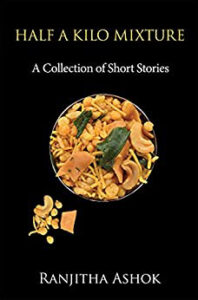Registered with the Registrar of Newspapers for India under R.N.I 53640/91
Vol. XXXI No.7, July 16-31, 2021
A thoughtful study of human nature, delivered in shades of Madras
by Varsha Venugopal
To readers of Madras Musings, hers is a familiar name, she having written several humorous articles for it over the years. She has also assisted our founder S. Muthiah in several projects of his. Now, Ranjitha Ashok has donned a new hat and emerged as a writer of short stories. Madras Musings spoke to her on her latest book Half a Kilo Mixture, a collection of short stories published by Notion Press.
Tell us about your journey as a writer, Ranjitha.
I was immersed in books and stories even as a child. I would read incessantly and even make up stories in my head which I would write down. I don’t think I consciously chose writing as something I wanted to do. I found myself naturally drifting towards literature and later, from 1994 onwards, I began working with S. Muthiah on a regular basis. I occasionally did some research for him and also wrote profiles and humour columns – writers like Erma Bombeck and PG Wodehouse showed me that the smallest little things in life can be made into funny stories!
As my family grew, I began mining my own experiences and observations to develop them into short stories. Actually, some of the stories in Half a Kilo Mixture were written a long time ago. As I began to write more of them over the past six, seven years, I realized that it was shaping into a collection.

The stories in Half a Kilo Mixture all seem to carry an underlying theme of the ‘outside perspective’, an attempt to understand another’s feelings and experiences – the story of the young woman bonding with a mother who’s lost her son for instance, or the one of a newly engaged couple trying to find familiar ground.
Now that you mention it, yes. I like to do that even as a person, I think. Observing people is a fanciful thing, isn’t it? Like I mentioned before, these stories have come out of life experiences. I haven’t created a fantasy land. I hope that anyone who reads the book will find a feeling of familiarity with it, too.
I must mention the intriguing perspective you’ve explored of one of the most famous stories in the Mahabharata – Draupadi’s disrobing. I thought it quite refreshing to examine the incident from the point of view of fringe characters.
As far as our traditions go, the Mahabharata is wonderful. You can keep mining it and it never stops giving stories. There are so many ways you can look at it, too – you can endlessly debate about the characters and the stances they took. Even as a young person reading the epic, I used to wonder how and why did it impact the so-called “ordinary” people? They never asked for any of it. I remember reading a wonderful story by Mahasweta Devi that sort of solidified the vague sense of unease I felt that none of the epics speak of the common folk whose lives were split apart by the drama.
The stories do feel like your own personal exploration, something you had to do for yourself.
Yes, absolutely. Perhaps I had to work out a few things and understand them for myself and that exercise came out in the form of short stories.
This empathy you seem to have as an author has also perhaps drawn-out different facets of the city in your book. Even though it isn’t often recognised as such, Chennai is a melting pot of communities – and your book manages to hit upon some of those unique personalities.
Chennai wears her diversity proudly, yes. But I must say that this wasn’t a conscious decision. It’s quite clear in the story where I play with Madras baashai, but the collection honestly evolved on it’s own.
You didn’t grow up in Chennai, though, did you?
I didn’t grow up here, neither did I go to school or college here. I am from Bangalore. I used to visit often in my younger days on holidays, as I have family here – cousins and grandparents. I moved to the city later and have now been here for more than four decades.
The backdrop of Chennai is unmistakable in your stories, though.
There’s something about this city – her true character. Chennai never stops giving me stories. She’s constantly inspiring me. There’s so much in the city that’s so appealing. I think working with Muthiah was an influence on me, too – his love for the city and his perspectives of Chennai, or Madras I should say, was infectious.
As a collection that’s grown organically over the years, does the book reflect how times have changed?
Are you asking me about the pandemic, specifically? You know, strangely, it never struck me at any point to bring it into the book’s universe. Maybe somewhere there was a need to stick to a time when the world was not facing this crisis. I have written humour pieces on the pandemic for papers like Madras Musings, but it isn’t a part of Half a Kilo Mixture.
Who are your writing influences?
That is a difficult question to answer. My reading habits have changed over the last 15, 16 years. I grew up reading Georgette Heyer and Agatha Christie but over the last decade I’ve been reading histories, biographies, a lot of philosophy. I cannot name a single author or genre as an influence. Come to think of it, It is rather strange that I drifted away from fiction and then wrote a book of short stories. Not quite sure how that happened (laughs).
Published by Notion Press, the book is priced at Rs 350 and can be bought from Amazon, Flipkart and https://www.notionpress.com. They are also available at Starmark, Higginbothams and Odyssey.

